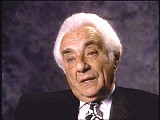You searched for: hiding
<< Previous | Displaying results 441-450 of 499 for "hiding" | Next >>
-
Mass Shootings of Jews during the Holocaust
ArticleAlmost one third of the six million Holocaust victims were murdered in mass shootings.
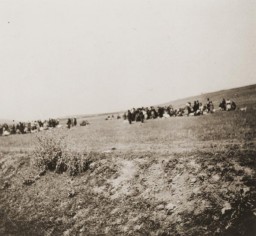
-
The Security Police (SiPo)
ArticleThe Security Police (Sicherheitspolizei, SiPo) was a German police organization created by Heinrich Himmler. Learn about its origin and role in the Holocaust.
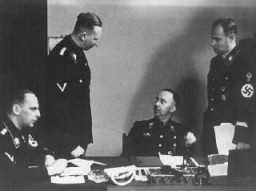
-
Barbara Ledermann Rodbell describes her reaction to Nazi-mandated schools for Jewish children in Amsterdam
Oral HistoryIn 1933 Barbara's family moved to Amsterdam, in the Netherlands. They became friends of Anne Frank and her family. The Germans invaded the Netherlands in 1940. Barbara's boyfriend, Manfred, had underground contacts and she got false papers. Her mother, sister, and father were deported to Westerbork and then to Auschwitz. Barbara survived using her false papers and worked for the resistance. She helped take Jews to hiding places and also hid Jews in an apartment held in her false name.
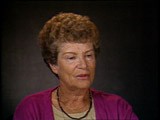
-
Barbara Marton Farkas describes deportation from Hungary to Auschwitz
Oral HistoryBarbara was born in the province of Arad in northern Transylvania, Romania. She went to school until the Hungarian army occupied the area in 1940 and she was no longer allowed to attend. After the Germans occupied Hungary in 1944, discrimination against Jews intensified. Barbara and her family were forced into the Oradea ghetto. She worked in the ghetto hospital until she was deported to the Auschwitz camp. At Auschwitz, she worked in the kitchens to receive extra food. She was deported to another camp,…
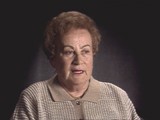
-
Julian Noga describes conditions in Flossenbürg
Oral HistoryJulian's Catholic parents had settled in the United States, but his mother returned to Poland. In 1939, Julian was deported to Austria to do farm labor after he was caught for hiding a rifle. On the farm he met the landowner's daughter, Frieda, his future wife. He was arrested in 1941 because relationships between Austrians and Poles were considered illegal and in 1942 he was deported to the Flossenbürg camp in Germany. During a forced march in 1945, he was liberated by US forces. Julian and Freida…
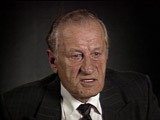
-
Charlene Schiff describes her liberation by Soviet troops
Oral HistoryBoth of Charlene's parents were local Jewish community leaders, and the family was active in community life. Charlene's father was a professor of philosophy at the State University of Lvov. World War II began with the German invasion of Poland on September 1, 1939. Charlene's town was in the part of eastern Poland occupied by the Soviet Union under the German-Soviet Pact of August 1939. Under the Soviet occupation, the family remained in its home and Charlene's father continued to teach. The Germans…
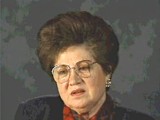
-
Fred Bachner describes flight to eastern Poland upon the German invasion of Poland in September 1939
Oral HistoryFred was born to Polish Jewish parents in Berlin, where his father owned a factory. After the Kristallnacht ("Night of Broken Glass") pogrom in November 1938, Fred's father and brother were deported to Poland. It was not until June 1939, when Poland allowed Fred and his mother to enter the country, that the family was reunited in Krakow. Fred and his family tried to flee upon the German invasion of Poland in September 1939 but were told to return to their homes. They were forced into the Krakow ghetto, and…
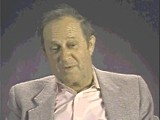
-
Susan Bluman describes fleeing to Vilna after the occupation of Poland
Oral HistorySusan was 19 years old when Germany invaded Poland in September 1939. Her boyfriend, Nathan, was in Lvov when the Soviet Union occupied eastern Poland. Nathan sent a guide to Warsaw to bring Susan to the Soviet zone of occupied Poland. Her parents reluctantly agreed after Susan promised to return to Warsaw within two weeks. Upon her arrival in Lvov, Susan married Nathan. The couple then fled across the Lithuanian border to Vilna, where they stayed for a year. They received a visa for transit through Japan…
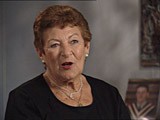
-
Lucine Horn describes obtaining false papers to assume the identity of an "Aryan" outside the Warsaw ghetto
Oral HistoryLucine was born to a Jewish family in Lublin. Her father was a court interpreter and her mother was a dentist. War began with the German invasion of Poland on September 1, 1939. Lucine's home was raided by German forces shortly thereafter. Soon after the German occupation of Lublin, Jews there were forced to wear a compulsory badge identifying them as Jews. A ghetto in Lublin was closed off in January 1942. Lucine survived a series of killing campaigns and deportations from the ghetto during March and…
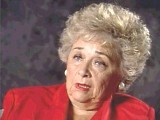
-
Felix Horn describes antisemitism in Lvov and conditions in the Janowska camp
Oral HistoryFelix was born to an assimilated Jewish family in Lublin, Poland. His father was a locksmith and his mother was a singer. Following the German invasion of Poland on September 1, 1939, Felix fled east to Rovno and then to Soviet-occupied Lvov, where he was accepted at a medical school. After the German invasion of the Soviet Union in June 1941, Felix was taken to a labor camp. He escaped and returned to Lublin, and found that his family had been forced into the ghetto established there. After the…
